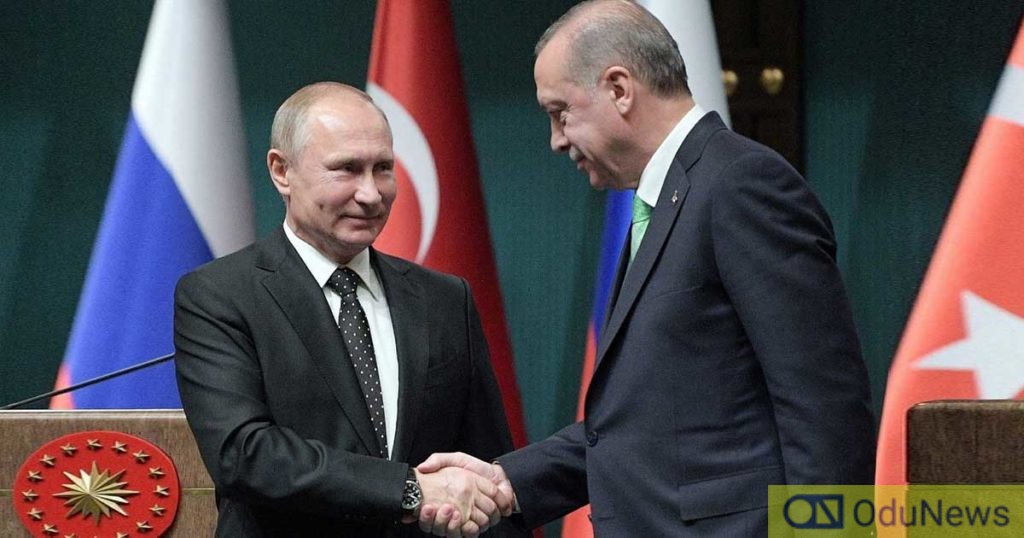Russian President Vlaimir Putin and his Turkish counterpart Recep Tayyip Erdogan agreed to a cease-fire in Northwestern Syria where escalating fighting had threatened to put forces from the two countries into direct conflict.

The deal struck by Russian President Vladimir Putin and Turkish President Recep Tayyip Erdogan also would set up a security corridor along a key east-west highway in Idlib province.
Putin voiced hope the agreement will serve as a “good basis for ending the fighting in the Idlib de-escalation zone, put an end to suffering of civilian population and contain a growing humanitarian crisis.”
The agreement appears to achieve Russia’s key goal of allowing the Syrian government to secure control over strategic highways essential for consolidating its grip on the country after a devastating nine-year war.
But in a nod to Turkey’s interests, the deal also puts the brakes on Syrian President Bashar Assad’s push to reclaim control over all of Idlib province, the last opposition-controlled region that borders Turkey.
Erdogan said he and Putin agreed to help refugees return to their homes. More than 900,000 people have been displaced by the fighting since Assad’s forces began an offensive in December backed by Russian airstrikes.
Both leaders had underlined the need for an agreement at the start of the Kremlin talks, which lasted more than six hours. One goal had been to prevent damaging their bilateral relations and blossoming trade.
U.N. Secretary-General Antonio Guterres “takes note” of the cease-fire agreement and hopes it will lead “to an immediate and lasting cessation of hostilities that ensures the protection of civilians in northwest Syria, who have already endured enormous suffering,” U.N. spokesman Stephane Dujarric said.
Guterres also called for a return to the U.N.-facilitated political process, aimed at ending the nine-year conflict, Dujarric said.
Until the latest crisis, Putin and Erdogan had managed to coordinate their interests in Syria even though Moscow backed Assad while Ankara supported the government’s foes. Both Russia and Turkey wanted to avoid a showdown but the sharply conflicting interests in Idlib province made it difficult to negotiate a mutually acceptable compromise.
The Syrian offensive in Idlib has resulted in Turkey sending in thousands of troops to repel the Syrian army. Clashes on the ground and in the air have left dozens dead on both sides. Russia, which has helped Assad reclaim most of the country’s territory, has signaled it won’t sit by while Turkey routs his troops.
The fighting also has pushed nearly 1 million Syrian civilians toward Turkey, which already hosts more than 3.5 million Syrian refugees. Erdogan responded by opening Turkey’s gateway to Europe in an apparent bid to persuade the West to offer more support to Ankara.
He has frequently threatened to open Turkey’s borders to Europe, maintaining that the European Union has not upheld its end of a more than 6 billion-euro deal designed to stem the flow of migrants after more than 1 million people entered the EU in 2015.
Putin discussed the situation in Idlib with European Council head Charles Michel, who met the Erdogan in Ankara on Wednesday. The Kremlin said Michel informed Putin about the EU’s efforts to block the flow of migrants.
Putin offered Erdogan his condolences over Turkish military losses but noted that Syrian troops also suffered heavy casualties. Turkey’s Defense Ministry announced that two more of its soldiers were killed Thursday, raising the number slain in Syria since the start of February to 60.
“The world’s eyes are on us,” Erdogan had said. “The steps we will take, the right decisions we will take here today will help ease (concerns in) the region and our countries.”
After Turkey had downed several Syrian jets, Moscow warned Ankara on Sunday that its aircraft would be unsafe if they enter Syrian airspace.
Opposition activists in Idlib blamed Russia for Thursday’s strike on a rebel-held village that they said killed at least 15 people, including children, and wounded several others. The Russian military had no immediate comment, but it has denied similar claims by insisting it hasn’t targeted residential areas.

